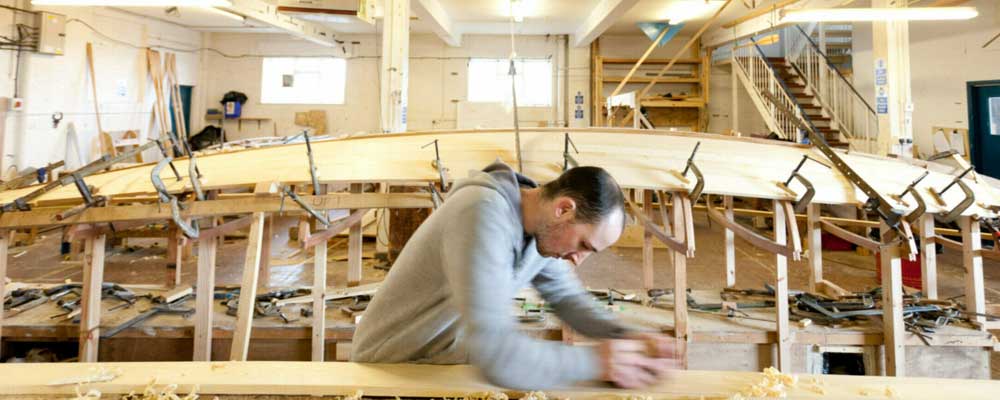In Dubai, boatbuilding is more than an art—it’s a living testament to the region’s relationship with the sea. While glass towers dominate the skyline, the dhow still symbolizes resilience and history. Traditional boatbuilding workshops, particularly those in areas like Al Jaddaf, continue to preserve this legacy. Visiting these spaces reveals not only tools and techniques passed through generations but also how they adapt to modern sustainability concerns. It’s where craftsmanship meets cultural memory, and where visitors witness frames emerging from timber with meticulous precision.
Al Jaddaf remains the core of traditional boatbuilding activity
Tucked between Dubai Creek and the Ras Al Khor industrial zone, Al Jaddaf has long served as the city’s maritime craftsmanship heart. Although much of the area has modernized, a small number of boatyards still operate there, mainly focusing on wooden dhows. These workshops often run informally, with most masters learned through apprenticeship rather than institutional training. Walk-ins are generally welcomed during the day, especially outside peak summer hours. Some craftsmen explain their techniques or offer short observational sessions for those genuinely interested.
Look for cultural hubs that integrate heritage skills into programming
Institutions like Alserkal Avenue and Tashkeel occasionally host collaborative programs that spotlight traditional crafts, including boatbuilding. These aren’t full shipyard operations but offer a contextual introduction. Through curated exhibitions or one-day workshops, participants can interact with models, miniature dhow assembly, or timber treatments used in boat preservation. For those new to the scene, these venues provide foundational exposure before stepping into more technical environments.
Seek seasonal festivals that include maritime craftsmanship demonstrations
During events like the Heritage Festival in Al Shindagha or National Day celebrations along Dubai Creek, boatbuilding demonstrations are sometimes featured. These allow artisans to present live shaping and joinery techniques, giving attendees a close-up view of the process. Such festivals are usually supported by Dubai Culture or the Ministry of Heritage, ensuring authenticity. Because participation slots for hands-on interaction are limited, we suggest arriving early or pre-registering through official cultural platforms.
Workshops linked to museums offer structured learning environments
The Al Shindagha Museum near Dubai Creek includes sections focused on maritime heritage and boatbuilding. Occasionally, they run short-term workshops where learners assemble miniature dhow replicas under expert guidance. These workshops are more structured, offering written materials and translated instruction for non-Arabic speakers. Participants can understand terminology such as keel, mast, and rudder in both traditional and modern contexts. Sessions are designed to reflect UAE heritage standards and often attract students or cultural researchers.

Dubai-based boatyards slowly integrate modern training formats
A few newer boatyards in Dubai Industrial City and Jebel Ali now incorporate boatbuilding into their marine engineering programs. While these tend to focus on fiberglass or metal vessels, some offer segments dedicated to traditional woodwork. These sessions are typically private and require prior booking. Prospective participants should inquire about visiting options, safety briefings, and required clothing or materials. Engaging with these modern facilities helps learners bridge past techniques with present maritime needs.
UAE maritime schools occasionally open up traditional electives
Institutions such as the Emirates Maritime Academy sometimes include heritage-related electives, particularly for students studying naval architecture or vessel maintenance. While not open to the general public on a daily basis, these schools may hold open house events or knowledge-sharing days. If you’re looking for a more academic lens on boatbuilding in Dubai, this path allows for interaction with instructors combining technical theory and historical context.
Community-led initiatives revive boatbuilding for younger generations
Some community centers, especially those supported by heritage preservation grants, organize informal meetups or workshops in partnership with retired craftsmen. These gatherings aim to keep traditional knowledge alive among younger audiences. Tools are provided, and participants may learn everything from timber sourcing to caulking techniques. These sessions are usually in Arabic but often include English-speaking facilitators. They’re a great way to immerse yourself in cultural continuity rather than commercial production.
Always prioritize workshops that respect environmental regulations
Modern boatbuilding in Dubai operates within strict environmental and zoning frameworks. Wood types, adhesives, and paint used in traditional crafts must comply with UAE’s sustainability codes. This is particularly crucial in areas near water bodies like Dubai Creek. Workshop organizers usually ensure that all materials meet Dubai Municipality guidelines. As a participant or observer, it’s vital to choose workshops that demonstrate eco-conscious behavior, especially in a region balancing rapid development with cultural preservation.
Finding workshops requires local awareness and timing
Unlike commercial classes advertised year-round, boatbuilding workshops in Dubai often follow seasonal rhythms and cultural calendars. The best way to find one is through local cultural centers, museum event boards, or word-of-mouth in areas like Deira and Al Fahidi. Traditional knowledge thrives in quiet corners of the city, and asking around respectfully often opens doors. It’s also helpful to follow UAE arts and heritage social media accounts that announce public programming and pop-up craft sessions.
While Dubai sails toward the future, its wooden hulls still echo with the pulse of ancestral memory.
This guide was written by www.few.ae team.
